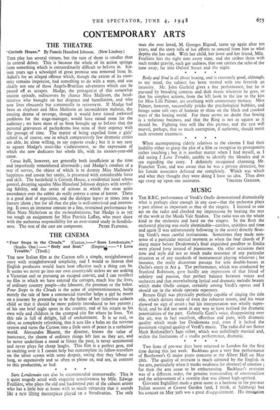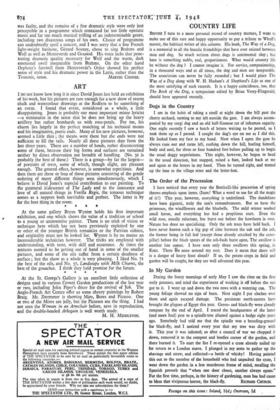MUSIC
THE B.B.C. performance of Verdi's Otello demonstrated dramatically what is perhaps clear enough in any case—that the orchestra plays a part almost as important as that of the singers. I listened to one act on the radio and checked my impressions by hearing the rest of the work at the Maida Vale Studios. The radio was on the whole kind to the orchestra and hard on the singers. In the flesh the orchestral playing was really abominable—careless, spiritless and time and again (I was unfortunately following in the score) directly flout- ing Verdi's most careful instructions. Sometimes they made non- sense of a particular musical moment as when the four chords of F sharp major before Desdemona's final anguished goodbye to Emilia were played forte instead of pianissimo. On other occasions their tone and style did not so much make nonsense of any particular situation as of any standards of instrumental playing whatever ; for instance, the really disastrous passage for solo double-basses at Otello's entry in Act 4. The performance, which was conducted by Stanford Robinson, gave hardly any impression of that blend of subtlety and passion, that perfect balance between voices and orchestra and that overwhelming lyrical and dramatic melodic beauty which make Otello unique, certainly among Verdi's operas and I should say in the whole operatic repertory.
Renato Gigli was physically perfectly capable of singing the title role, which defeats many of even the robuster tenors, and his voice showed no sign of strain ; but his interpretation was wholly super- ficial, and he did not seem in any way to have realised the dramatic potentialities of the part. Gabriella Gatti's voice, disappointing over the air, was in fact excellent, effortless and pure, with dramatic quality which made her Desdemona real, even if it lacked the passionate virginal quality of Verdi's music. The radio did not flatter Mark Rothmiiller's Iago either, which was unfailingly musical and, within the limitations of a studio performance, dramatic.
Two lions of pre-war days have returned to London for the first time during this last week. Backhaus gave a very fine performance of Beethoven's G major piano concerto at the Albert Hall on May 28th. The quality of restraint is much admired by the English in the arts, particularly when it masks weakness (or absence) of emotion ; for then the arts cease to be embarrassing. Backhaus's restraint was of a different order, the genuine transcending of emotionalism and the achievement of a serenity that was almost high-spirited.
Giovanni Inghillieri made a great name as a baritone in the pre-war Italian seasons at Covent Garden (and, I think, at Salzburg) but his concert on May 30th was a great disappointment. His intonation was faulty, and the remains of a fine dramatic style were only just perceptible in a programme which contained far too little operatic music and far too much musical trifling of an indeterminable genre, including two disastrous songs of his own. Choice of programme can undoubtedly spoil a concert, and I was sorry that a fine French light-weight baritone, Gerard Souzay, chose to sing Brahms and Wolf as well as Monteverde and Gounod. His voice lacks that pene- trating dramatic quality necessary for Wolf and the warm, dark emotional swell inseparable from Brahms. On the other hand Orpheus's farewell from Monteverde's Orfeo showed his perfect sense of style and his dramatic power in the Latin, rather than the



































 Previous page
Previous page